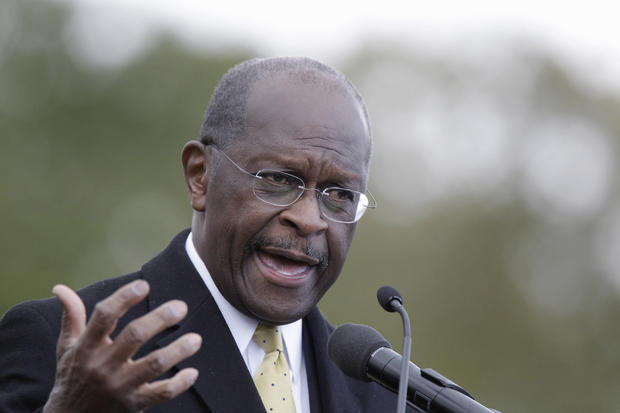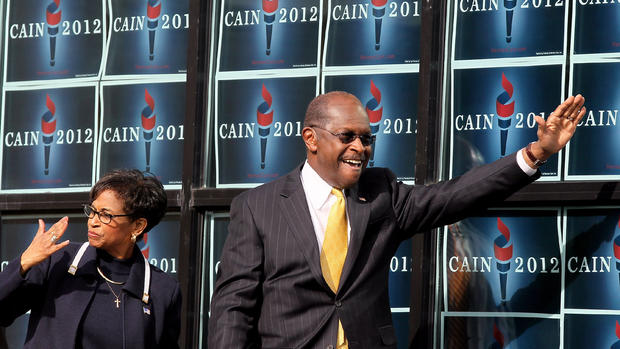Under fire, Herman Cain tweaks 9-9-9 plan
Stung by criticism that it would disproportionately burden poor and middle-class Americans, Herman Cain tweaked his 9-9-9 tax plan Friday, changing the plan to include exemptions for businesses that invest in downtrodden areas and a mandate that Americans under the poverty line not pay income taxes.
For those living below the poverty level, "Your plan isn't 9-9-9, it's 9-0-9," the former Godfather's Pizza executive said in Detroit. The 9-9-9 plan refers to a nine percent flat business tax, income tax and sales tax.
"Say amen, y'all," Cain added. "In other words if you are at or below the poverty level based on family size, then you don't pay that middle 9 tax on your income. This is how we help the poor."
Cain has been criticized both by Democrats and his Republican rivals for a plan that a number of independent analyses have found would raise taxes on poor and middle-class Americans while cutting taxes for the rich. A recent analysis from the nonpartisan Tax Policy Center found the plan would increase taxes on 84 percent of Americans, with those in the lowest income bracket hit the hardest.
The business exemptions - which Cain calls "opportunity zones" - would deliver special tax incentives to hard-pressed cities.
"The opportunity zones will allow cities like Detroit to qualify for additional exemptions relative to the first 9," the flat 9-percent tax on businesses, Cain said. He noted that the recession has hit inner cities and minority communities particularly hard. Cain claimed that he had always meant to include the "opportunity zones" in his plan but "simply chose not to talk about this piece earlier."
The zones would feature a zero capital gains tax, payroll tax deductions, and tax deductions for those living and working in the zone, the Cain campaign specified in a statement. In his speech, Cain said that the plan would also allow for same-year deductions for capital investments, an incentive that he argued could help property developers invest in dilapidated buildings like the one he stood before, Michigan Central Station. The facility, once an elegant cornerstone of Detroit, is abandoned and in advanced disrepair. A sign across the windows says, "Save the depot."
"What if an investor wanted to do something with this building behind us?" Cain said. "And what if they wanted to spend $10 million to turn it into a mall or a restaurant facility or a destination facility in this city? Under 9-9-9, they would be able to deduct that capital investment in the year that they make it."
Cain stressed that "this is not an entitlement program," but a program for individuals and communities to help themselves.
Cain's defended his tax plan Friday as "simple," "transparent" and "fair," and said that in crafting it, he borrowed on his background doing economic analysis for the Pillsbury company and his experience on the National Commission on Economic Growth and Tax Reform in 1995. He also pointed to a Wall Street Journal editorial by supply-side economist Arthur Laffer that defended his plan.
"Everybody gets treated the same, that's fair," Cain said."It levels the competitive playing field."


